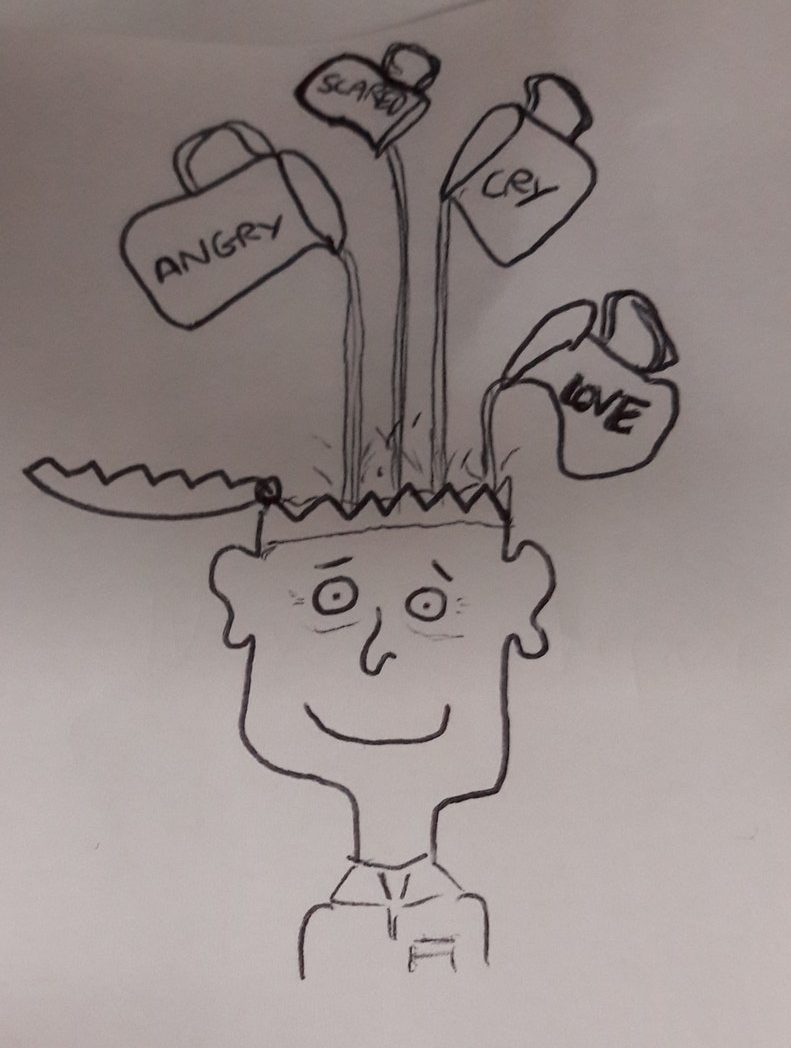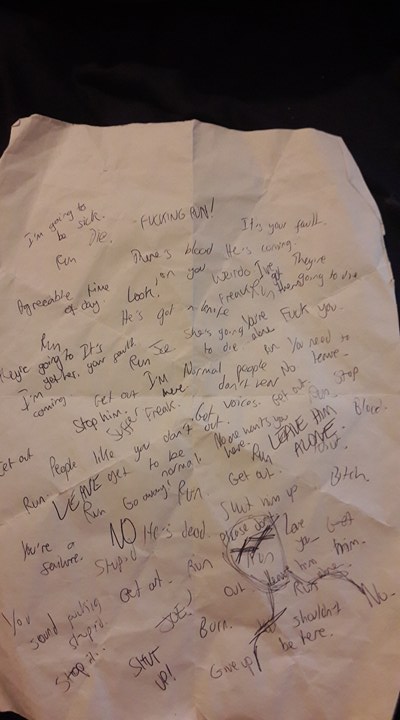*WARNING* This article contains *major* spoilers for Hellblade: Senua’s Sacrifice.
Hellblade: Senua’s Sacrifice is one of the most unique and significant video games of my lifetime. A bold claim, perhaps, but not one without merit.
Why though? It’s innovative in theme, yes, a seamless blend of hack and slash, horror and Norse mythological adventure.That isn’t why. The gameplay then? Well, no. While entertaining, it is a little clunky in its own idiosyncratic way. That’s not it either.
Senua, Hellblade’s protagonist, suffers from psychosis. This is portrayed throughout the game by a number of distinct Voices, visual hallucinations and distortions, flashbacks, and delusions. The player is forced to experience every skin crawling syllable and mocking barb that Senua endures as she fights her way into Hell itself to retrieve the soul of her beloved.
At any one point the Voices, (or Furies as the game refers to them), may praise, deride, encourage or taunt Senua as she fights her way through demonic creatures, dizzying heights and evil Gods. In short, Hellblade is an enjoyable, refreshing action-adventure game, whose protagonist just happens to be psychotic.
However, NinjaTheory, (the production company behind Hellblade), have created something rather more significant than first meets the eye. Hellblade is to my knowledge the very first video game to broach the subject of psychosis, and it does so magnificently. From the first moments, it provides a tiny but sickeningly real window into what it is like to live with auditory hallucinations: the opening shows Senua paddling down a river while she is abused by her voices for minutes before the player even gains control.
This is how psychosis sufferers like me live every minute of every day of our lives. Our every motion, choice and thought is picked apart and commented on by the fears and doubts in our minds given life. The experiences that Senua (and by proxy the controlling player) have are the single most accurate portrayal of audiovisual psychosis that I have seen in any piece of fiction, and Hellblade delivers them to the player in a unique format that no other art form can achieve.
Despite the fact that estimates for the lifetime prevalence of Voice Hearing stand between 5 and 28% of the population, the stigma around hearing voices is still brutal, and causes many people who truly need help to avoid seeking it out, out of shame or fear of persecution. “Normal people don’t hear voices.” I’ve heard that from real people, and, ironically enough, from my own voices. There is such a gulf in understanding put between neurotypical and non-neurotypical people by the cultural attitude to mental illness that any attempt to empathise, even with yourself, has somehow become collaboration. With them. With the others. With the crazy people.
Hellblade breaks down that barrier, plunging the player directly into the mind of the protagonist, warts, voices, visions and all. As the trauma and terror of Senua’s life are laid bare before them, there is a subtly nauseating feeling of voyeurism and violation, just a suggestion of the invasiveness and raw, naked, exposed vulnerability of having someone else run rampant in the most private, guarded and intimate corners of your mind.
If you have experienced psychosis, the delicate care put into the creation of Hellblade will be obvious. Included with the game is a featurette about the careful steps that the designers took to include feedback from both lived experience and mental health professionals. NinjaTheory could easily have brushed over this part of the process, gotten a single quote from one non-clinical researcher, and still loudly touted themselves as having ‘consulted experts’. The fully realised game is a testament to the level of inclusion of first hand experiences of psychosis in the writing and design of Hellblade, and this in turn is the thing that makes it so exceptional.
Hellblade confronts many parts of mental illness that sufferers have to deal with on a day to day basis that are not immediately obvious to people with no experience of them. The first time I played through the opening, I called my housemate in to my bedroom to listen to Senua’s voices. “This. Just this. This is what it’s like, every moment, all the time.” Not ten minutes into the game, the screen begins to distort and flash, as a roar of static builds in the speakers. “Oh God!” he said. “Why is everything so bright and loud? That’s awful!” That is Sensory Overload, and it’s why I have anxiety attacks in supermarkets.
Similarly, the game’s ‘permadeath’ function acts as a perfect metaphor for the hopeless dread that creeps in on the edges of psychosis, the reason why schizophrenia is so often correlated with depression, and the reason for our 5% lifetime incidence of successful suicide attempts. From early in the game, the player is warned that every time Senua fails or dies, the rot eating away at her hand will spread throughout her body, until it finally kills her. Permanently.
It is this Sword of Damocles that hangs over your head as you play, making you doubt every decision, making you dread every confrontation. Maybe this will be the one that finally ends me, you think.The one that will be too much. I don’t want to die.
The thing is… there is no permadeath in Hellblade. No matter how many times you die, the rot will never claim you. There is nothing to fear but fear itself, so the saying goes, but you have no way of knowing this as you struggle through, paranoid about where the next attack will come from, where the next threat will be concealed. The game lies. Your mind lies. You are the unreliable narrator.
Hellblade also tackles the theme of abuse, specifically in regard to mental illness. Her meeting with her mentor, Druth, is shown to have happened after Senua is driven out, forced to become a Geilt in the forest, a cursed and banished thing. Senua’s mother Galena is shown in flashbacks to have very similar experiences to Senua herself, and in the game’s denouement is shown being burned alive by Senua’s father for refusing to renounce her voices.
In fact, Senua’s true downspiral into the Darkness comes only after her mother’s murder at the hands of her father, and her lover’s execution at the hands of raiding Norsemen. She doesn’t reach Hel until trauma and violence at the hands of others drags her there. A sane reaction to insane circumstances.
And I know. No one gets burned alive anymore.
But a person with serious mental illness has a 1 in 4 chance of suffering violence as a direct result of their condition in any given year, most commonly at the hands of a partner, carer or family member. That’s 14 times more likely than the average person. People like me are much more likely to be the targets of violence than the perpetrators, even while we are packaged neatly into a parcel that society has stamped with [KILLER].
Yet somehow, Hellblade’s Pictish warrior woman struggles through the story as simply a normal human. There is a bizarre and grotesque trend in screen media in recent years to portray neurodivergent people as superheroes – Sherlock, Monk, The Big Bang Theory to name just a few. Senua’s aides at least have the good grace to be supernatural – a magic mirror, the Sword of Odin. Her illness itself seeks only to undermine and abuse her, even as she accrues the power she needs to fight an unwinnable battle against the Darkness.
And somehow, Senua continues. Despite the abuse and trauma she has suffered at the hands of her Darkness, she carries on. Despite grief and pain and loss. Despite everyone she knows calling her monster, plaguebringer, outsider, when all she has ever done is feared the rest of the world.
I know that fight. It’s exhausting. It’s excruciating. It’s demoralizing, dehumanizing and humiliating.
But it’s the fight that I, and every other one of the 75 million schizophrenia sufferers in the world get up and fight every day, even as all the while we are unthinkingly and ignorantly branded as monsters, when all we ever wanted was to live as everyone else does.
It’s time that video games took responsibility for their own prominence in our lives. Hellblade has set an example that must to be followed, regardless of whether this was its intention. An art form that a scant few years ago was only the realm of tessellated blocks and pixelated alien fleets now has the opportunity to do some real and tangible good in the world, perhaps as the only form of media to do so.
In news media, in TV, in film, mental illness sufferers are the invariable villains, the cheap and lazy target for the spiteful human reflex to need blame in recompense for tragedy.
We are the mass shooters. We are the drug addicts. We are the ones away from whom you hurry your children in the street.
Not any more.
Now we are strong.
Now we are victorious.
Now we are heroes.
Joseph Hand is a biology graduate and aspiring actor from Southampton, UK. He is an avid tabletop gamer and singer, and is quite partial to the music of Johnny Cash.
His recorded work has been used by the NHS to introduce recently diagnosed psychosis sufferers to alternative therapies, such as roleplaying gaming.













